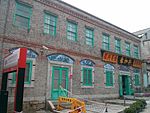Jung District, Incheon
Districts of IncheonJung District, IncheonPages with non-numeric formatnum arguments

Jung District (Jung-gu, Korean: 중구; 中區) is the historic central ward of the city of Incheon, South Korea, one of the eight wards into which Incheon is divided. Its name means "central" in Korean. It was founded in 1883 on the opening of the Jemulpo Port and contains several historical and cultural heritage monuments, such as Dap-dong Cathedral, Hongyemun Gate, The First Anglican Church, and Jayu Park, Korea's first modern park. Incheon is the gateway to Seoul, the capital of South Korea. In modern times it became a trading port, eventually growing to become the second-largest port in South Korea. Incheon International Airport also locates in Jung District.
Excerpt from the Wikipedia article Jung District, Incheon (License: CC BY-SA 3.0, Authors, Images).Jung District, Incheon
Jemullyang-ro 206beon-gil, Incheon Sinpo-dong
Geographical coordinates (GPS) Address Nearby Places Show on map
Geographical coordinates (GPS)
| Latitude | Longitude |
|---|---|
| N 37.472222222222 ° | E 126.62222222222 ° |
Address
제물량로206번길
Jemullyang-ro 206beon-gil
22314 Incheon, Sinpo-dong
South Korea
Open on Google Maps










